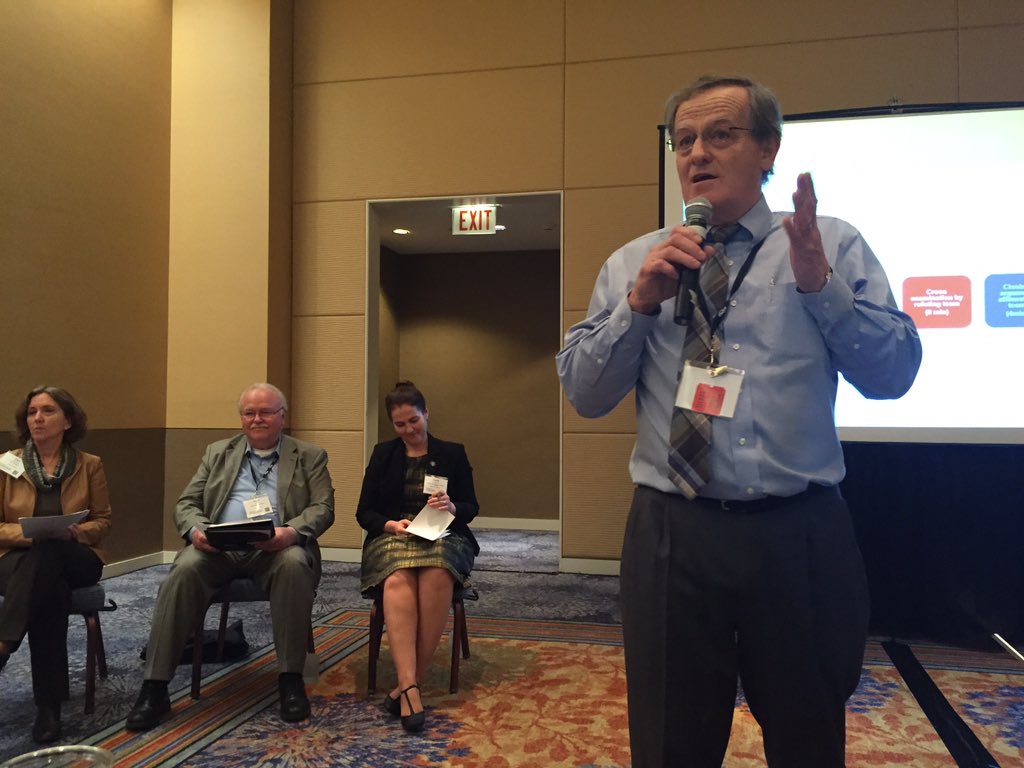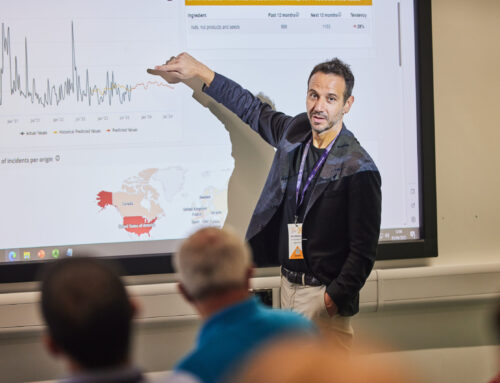
It was about a year ago when I traveled to snowy Michigan in order to take part to a very interesting event that the MSUglobal team of the Michigan State University (MSU) hosted in East Lansing: the Open Knowledge for Agricultural Development Convening 2013 that the MSU, OER Africa, and The Regional Universities Forum for Capacity Building in Agriculture (RUFORUM) organized with funding by the Bill & Melinda Gates Foundation and MSU. This was the first time that I heard about the Global Food Safety Partnership (GFSP) by Dr. Brian Bedard, a Senior Livestock Specialist at that time working with The World Bank.
In his very interesting and inspiring talk (that was right after mine), Brian explained that food safety is a very complex problem, since in today’s world, food’s journey from meadow to meal or hook to cook can include multiple steps, many vehicles, and several transformations. As a result, the opportunities for the introduction and spread of contamination increase. Tackling this requires organized, coordinated approaches to ensure the safety of the world’s food, which will be across borders, governments, and industry. And this is what the GFSP was conceived to do: set up a a unique public-private initiative dedicated to improving the safety of food in middle-income and developing countries, by bringing together business and industry, governments, regulatory bodies, international development organizations, fishers and farmers, and civil society to drive a globally-coordinated and locally-driven food safety approach.
After the Convening, we had the opportunity to work closely with the MSUglobal team to further investigate how we could power such a global initiative with federated architectures of content repositories that would bring together private educational offerings and OER collections on food safety topics. Our first thoughts have been published at the Journal of Asynchronous Learning Networks (JALN) in a paper titled “An Open and Scalable Learning Infrastructure for Food Safety” (co-authored with Babis, Karen Vignare, and Chris Geith).
I also tested the ideas that we developed on an open learning infrastructure that could help build the repositories’ backbone of GFSP against a group of young e-learning specialists that attended a lecture that I was invited to give at the University of Piraeus on a topic of my choice. I tried to talk to them about the complexities that exist in building such an infrastructure, such as the elaborate and diverse knowledge organization schemes that are used within the food sector’s capacity building activities. The slides of this talk are here and show some of our preliminary thinking on how we could crack some of these difficult problems:
Still, the real challenges had yet to come. And the opportunity to pursue this work further came with the kick off of GFSP’s Knowledge and Learning Systems Working Group (KLSWG) that took place in November’13. Chris Geith published an open call to arms to everyone interested to participate at a working group that “…is taking on the challenge of recommending practices and tools that will enable solutions for the GFSP… grounding this in OPEN: open content, open data, open access, open knowledge, open credentials and the range of models that put these into action at the local level to create impact.” (from the great blog post of Chris on creating an open engagement ecosystem with the GFSP).
The KLSWG will devote the next months to develop a set of written recommendations to the GFSP by June 2014. As Chris wrote when she invited some great people to join the KLSWG, some of the food safety challenges that are explaining this work, are:
a. There is an ever-changing morass of local, federal, international and private standards and regulations to which different actors in the system need to comply.
b. Standards and regulations change frequently and rapidly and are not easy to find and interpret correctly.
c. Food safety behaviors at the farmer and processor levels requires things like the following: carrots and sticks in regulation, carrots and sticks in social norms (culture), new knowledge, compliant practices.
d. The “new knowledge” required is 80% standard (estimating).
e. There is some sort of a cost barrier here as well.
Of course, we were looking forward at such an opportunity to work with great people and teams around the world to help define possible ways in which these challenges may be addressed. And I am proud to say that we are particularly involved in a KLSWG Subgroup that is much relevant to our interests: the one called the Database Subgroup. This Subgroup is looking into the way that existing catalogs of food safety training “suppliers” or offerings can be the starting point for the creation of a more generic landscape view of the current marketplace of capacity provision.
This service should allow people to view information about food safety capacity providers and offerings through an online platform (also viewable on mobile devices). It will develop a live demonstrator that will serve as a proof of concept and help the Subgroup make recommendations about how to structure relevant data so that it can be shared in a coherent, interoperable and secure way. The Agro-Know team used a list of providers that the GFSP Secretary maintained and has already developed a preliminary prototype that shows how such a service could look like – I will tentatively call it the GFSP capacity provision discovery pilot.
The Database Subgroup can also make suggestions for taking this service to another phase of usefulness and potential collaboration with other database, groups, etc. For instance, this can be by suggesting mechanisms to source additional information and to source additional providers, particularly non-traditional ones; proposing a strategy for identifying interest in sharing existing materials as OER and creating new OER; exploring other ways to really step up the functions of the service; or any other way that will help us better position this information as a central node at the GFSP ecosystem.
Apart from the great Agro-Know’ers (such as Effie and Nikos) that will be at the forefront of our contributions in the KSLWG Database Subgroup, there are some very interesting people that will also participate:
– Erika Nelson who is a Chief Operating Officer at the National Center for Food Protection and Defense (NCFPD) (USA): the NCFPD team has developed and is maintaining a platform that they call CoreSHIELD and that US agencies and labs have built portals on it to help protect the food supply. A great demonstrator is the FoodSHIELD portal that contains very relevant resources like training videos. The NCFPD web site itself also holds a wealth of online resources for various audiences (students, educators, professionals etc.). I would be very much interested in exploring how this information may be shared with services like the discovery pilot, as well as how elaborate classifications like the NCFPD Food Defense curriculum can be used (e.g. as a subject vocabulary) to better describe the curriculum topics that the various resources are relevant to.
– William Krueger who is the President of CCCET Solutions, LLC (USA): Bill has been the driver behind the development of the CCCET framework, a unique way to enable standardized, secure and measurable integrated information sharing across diverse agency and organization web-based platforms. This brings a different perspective to open architectures that we have been typically working with and is giving particular care on issues like privacy and security. It would make perfect sense to try to combine solutions like the ones offered by CCCET with ours, to explore topics like the alignment of data around a single set of unique identifiers and security protocols, so that we ensure that the multitude of aliases and relationships for entities, people and associated activities are properly indexed; and that security protocols that can ensure control and validation of who is able to view or access the data, are put in place. In the case of the GFSP discovery pilot, this would be particularly useful in order to have a secure registry of food safety data providers and consumers, in order to allow providers define access/security levels to the information that they share with others.
– Deleep Kumar who is a Principal Scientist and Global Leader and Coordinator for South-South Exchange, working on Knowledge Sharing and Innovation at ICRISAT (India): I know that ICRISAT has some very interesting training offerings on food safety topics, I would really like to see how we can include them in the discovery pilot. And I was amazed by the recently launched Explore It! open knowledge repository of ICRISAT – read more about it here.
– John Noonan who is leading the Curtin University (Australia) SQF program and has long experience in the development and management of Quality Assurance programs in the Livestock and Grains industries and the SQF program of Curtin: I see that John is working on local, national and global food security topics at Curtin’s International Institute of Agri-Food Security (IIAFS) and I am looking forward to his perspective on the way that we plan to develop such a (potentially) global information resource on food safety.
I am excited about this Subgroup and the potential of what our collective experience and brainpower may do. We will start working very soon on the proof of concept, stay tuned for periodic updates!




